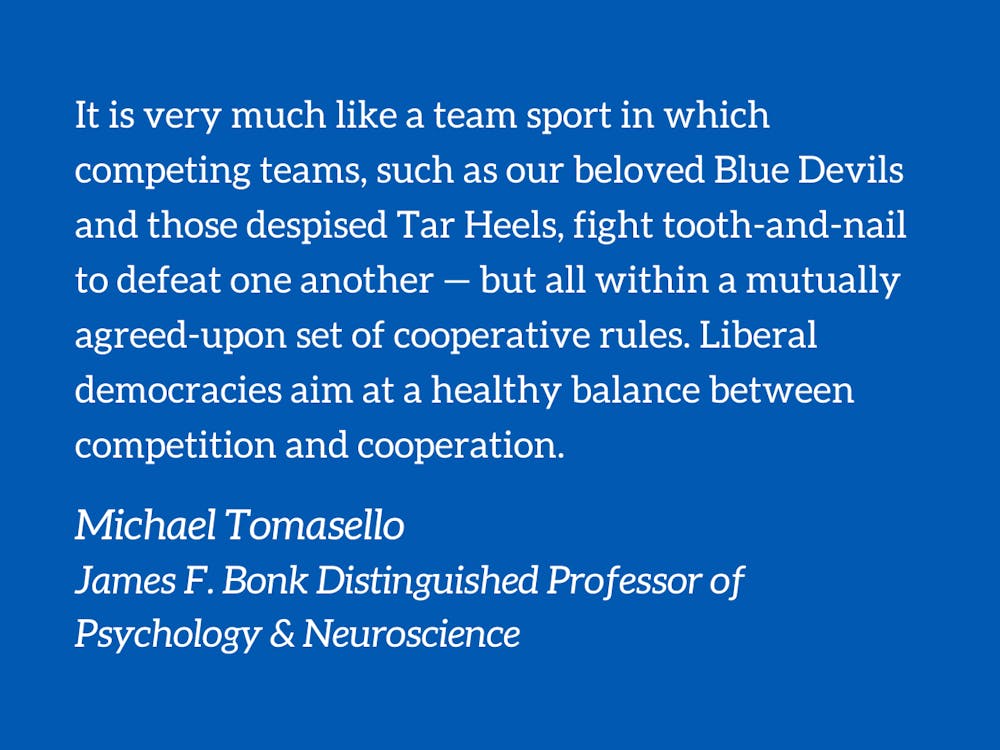Democracy often seems like unfriendly competition, with all its arguing, partisanship, and mean-spirited attack ads. But underneath the rancor, democracy actually depends on a basic infrastructure of human cooperation.
In evolution, cooperation is difficult. Individuals who want to pass along their genes must look out for themselves, often in competition with others. Nevertheless, some species have developed forms of win-win cooperation such that all cooperators benefit (more than non-cooperators). The champions of such cooperation are ants and bees, who are special because all the individuals in a nest or hive share the same queen mother, so it's all in the family.
Humans around the world are great at cooperating in families. And early humans lived exclusively in small groups that were family-like in many ways: all group members were interdependent and helped one another reciprocally. But that Garden of Eden ended for most humans with the advent of agriculture and cities (a.k.a., civilization) some 10,000 years ago. As human cities and settlements grew ever larger and less family-like, small-scale cooperation based on interdependence and reciprocity was no longer up to the job.
In the last few centuries, large-scale human groups have organized themselves cooperatively in two main ways. First, they have looked to an individual, or small group of individuals, to act as parent-like bosses who make sure that everyone behaves. But parents can be defied, and so some monarchs have fortified their authority with claims of divine imprimatur, while other autocrats have fortified their authority with weapons. When monarchs and autocrats are benevolent, this form of societal organization can work. But, as Lord Acton observed more than a century ago, “Power tends to corrupt, and absolute power corrupts absolutely.”. So monarchs and dictators often foster discontent and discord in the populace and often end in one or another form of violence (or else in a powerless form of ceremonial monarchy, as in some European countries today).
Second, the alternative to person-based, parent-like authority is group-based organization, the ultimate form being communism, in which the ideal is for the larger group to consider itself as one big family. But large-scale modern economies cannot function effectively in this way, as the Soviet Union discovered when it tried to collectivize its farmers to pool their bounty every year for the benefit of all. It turns out that people work much harder and more diligently when it is they and their immediate families (and not lazy free riders) who benefit. The problem with communism is thus that it has too optimistic a view of the human potential for cooperation. Or as E.O. Wilson, the great scholar of ants and bees, observed about the communist system: “Great idea. Wrong species.”
And so have arisen in the modern world liberal democracies that allow individuals to pursue their self-interest so long as they follow cooperative rules of the game on which everyone in the group, through their representatives, agrees (rule of law). It is very much like a team sport in which competing teams, such as our beloved Blue Devils and those despised Tar Heels, fight tooth-and-nail to defeat one another — but all within a mutually agreed-upon set of cooperative rules. Liberal democracies aim at a healthy balance between competition and cooperation.
And their aim does not always have to be perfect. That is because liberal democracies are self-correcting. Unlike in autocracies, if the agreed-upon rules no longer work for the common good, there are ways for the people or their representatives to change them. For this, everyone must agree not just on basic rules, but also on second-order rules for how to change and enforce the basic rules — for example, via constitutionally specified legislative and judicial procedures. And of course, we can also vote to change our representatives as well.
Francis Fukuyama believes that, given human nature, modern liberal democracies are the best form of societal organization of which humans are capable. People vote with their feet, and those living in autocratic societies attempt to immigrate to liberal democracies much more often than the other way around. Nevertheless, autocrats are on the rise worldwide: we all sometimes wish for a parent who knows what is best for us and can make it happen. But as history has shown time and again, giving an autocrat power and hoping that they will use it for the common good is not a promising plan for good governance.
Michael Tomasello is the James F. Bonk Distinguished Professor of Psychology & Neuroscience. This piece is part of the “Virtues of Democracy” column, a series of op-eds by faculty and student contributors across Trinity College and the Sanford School of Public Policy. The column typically runs on Tuesdays or Thursdays.
Get The Chronicle straight to your inbox
Signup for our weekly newsletter. Cancel at any time.

